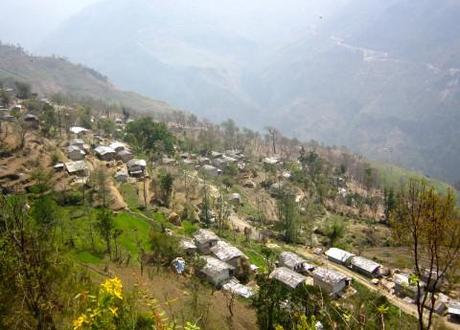 View from where the dialog took place. Photo: Dominik von Bohlen
View from where the dialog took place. Photo: Dominik von Bohlen
There was a rustling from the bushes below, followed by the bleating of goats. Then a middle aged woman suddenly appeared. She looked Aryan, not Mongol, and was wearing the standard village costume of the middle hills: a kurta sawal and a thick shawl over her shoulders. She was barefoot and wore a bulaki or septum ring in her nose. She blinks with surprise when she sees me and the store of food but does not appear to be overly concerned by my presence. Then she calls down to a companion on the bank below. “Sister, are you hungry? Here there is food. Yes, food. A Misty One sits behind a pile of oranges. Come see for yourself.”
The companion below has trouble hearing and the woman repeats herself before giving up and sitting down across from me on the level ground. The food – vegetables, a bag of rice, cooking ingredients, and some tangerines – lies between us. I say:
“If there is need for oranges please take one sister.”
The woman is surprised. Evidently she did not expect me to understand Nepali. Her manner changes. She becomes less brazen, slightly sheepish, like a child who has been caught out.
“No, there is no need for oranges.”
“Is there need for rakshi then?”
“There is rakshi too? What a store there is here!”
“Yes, there is rakshi too. It is not only for me but also for my companions. We are six.”
“And who might your companions be? More Misty Ones?”
“No, I am the only foreigner. I am camping here with Sonam, whose relative runs the village shop. We have come to visit the one they call Aven and he stays with us too. There is also the assistant of Aven and the two grandsons of Aven.”
“You are here for puja [a religious ritual] then?”
“Yes, that’s right.”
“I did not know that Misty Ones require puja but then there are many things I do not know.”
“You are right, Misty Ones do not usually require puja but Aven is my teacher. He is teaching me.”
“What is he teaching you?”
“The way of the jhankri.”
The woman seems either satisfied by or uninterested in my explanation and leans back silently on her heels in the squatting position. I pour her a cup of the rice wine we bought in the village and offer it to her. She accepts the offer and takes a sip. I try to re-engage her in conversation.
“Which is your caste?”
“I am a bahun. And my husband wears the sacred thread.”
“But you drink rakshi?”
“Yes. As does my husband.”
“Have you sons and daughters?”
“I have a son and two daughters. And you, Misty One? How many children do you have?”
“I have none.”
“But surely you are married?”
“I am not.”
“The ways of the foreigner are indeed strange. How many years have passed you by?”
“Thirty.”
“Thirty! And you are not married? Stranger still. It may be that there is a problem..?”
“There is no problem. In my country we marry late.”
“But if you are thirty and still have no wife and no children what is it that you do? What is the purpose of your life?”
“That is a good question sister.”
“But you have brothers and sisters? Is it not so?”
“Yes, I have a brother and a sister.”
“Then they are married?”
“No, they are not.”
“Then their age is less than yours?”
“No, their age is greater than mine.:
“Truly, the ways of the foreigner are strange. Tell me, Misty One, what is it that your sister does? She lives not in her husband’s house for she has no husband. What is it then that she does?”
“My sister has a cloud in her heartmind. She lives with other men and women with clouds in their heartminds.”
“Ah, she has been visited by the gods?”
“Yes.”
“In that case she should stay at home with your mother and father. They can look after her. It is not good for a child with a cloud in her heartmind to leave home. Do you not know this? If she lives together with others who have been visited by the gods who will there be to protect her from robbers and even witches? How is it that the Misty Ones are all so rich and yet so stupid? I do not understand for, though I am a bahun, I am just the wife of a poor farmer.”
“We are different from you.”
“Truly it is so.”
“But we are also not so different from you. After all, we are all just people. Is it not so?”
“It may be so. What do I know? I am just the wife of a poor farmer.”
With that the woman drained her cup of rakshi, stood up, and began to herd her goats uphill. As is the custom, she did not say goodbye.
This post first appeared on Dominik von Bohlen’s blog
